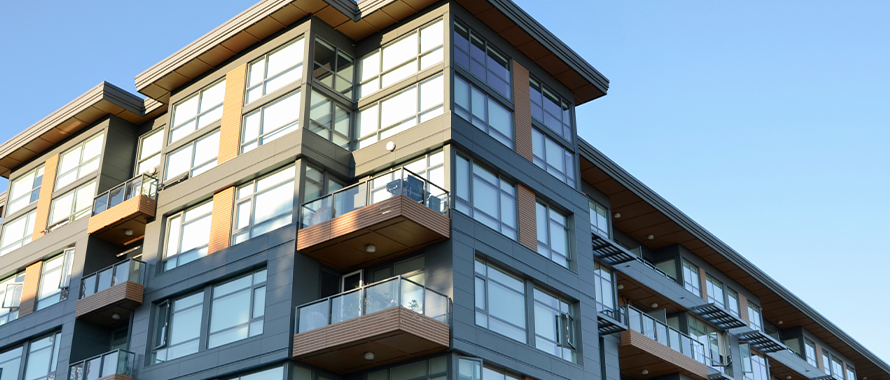Apartment complex owners and property managers are operating in a competitive industry with shrinking profit margins and a hardening Habitational Insurance market. To learn more, we spoke with Barry Whitton, Managing Director, Burns & Wilcox Brokerage, Atlanta, Georgia.
What are the greatest risks facing apartment complex owners and property managers?
B.W.: Historically, the most common losses faced by this industry include fire—accidental, arson and wildfires—and weather-related issues like hurricanes, flooding, hail and wind. Any severe weather event like a tornado or hurricane involves widespread roof damage. Over the last few years, continuing losses due to some of these risks have tightened insurance underwriting guidelines, resulting in reduced capacity in the marketplace and increased rates. There is a lot of pressure on the industry as a whole.
What kinds of insurance policies can help property owners respond to these risks?
B.W.: Commercial Property Insurance helps cover property damage due to fires and weather-related events. Limitations within those policies are important to consider. Depending on the age of the roof, roof replacement coverage limits could equal the replacement cost or the actual cash value of the roof—the older the roof, the more susceptible it is to damage from wind or hail. Apartments with aluminum wiring have a higher fire rate than complexes with copper wiring, and so some insurers exclude complexes with aluminum wiring from coverage. General Liability coverage is typically included in Commercial Insurance policies, but the primary exposures are usually property-related. Commercial Liability Insurance is also available to help with costs for slip-and-fall accidents, water damage and bed bug infestations.
What risk mitigation steps should property owners and managers take to complement insurance coverage?
B.W.: Property owners in wildfire-prone areas can help mitigate risks by making sure the areas surrounding their apartment complexes are clear of underbrush. They can also limit fire risks by prohibiting tenants from smoking, using candles or grilling on their porches or balconies.
Can you provide an example of a scenario you have dealt with that would help illustrate common risks?
B.W.: An apartment complex experienced a fire loss a few years ago that was caused by someone smoking on a balcony. A cigarette was thrown on the ground and a fire started overnight, resulting in a loss that the insurance company paid. At the time of the next renewal, that property owner had mandated a no smoking policy on its premises except for certain designated areas. Each tenant had to sign a document agreeing to abide by the policy. That sort of measure allows a broker to help demonstrate to underwriters that risk management and loss prevention steps have been taken.
Is there anything else property owners should know about preventing or mitigating their exposures?
B.W.: Property owners need to identify risks on their properties and invest in improvements in those areas to help prevent problems. For example, they need to spend money to keep their properties up to date. In today’s Habitational Insurance marketplace, property owners will face higher premiums and deductibles if they do not make these investments.
What are the greatest opportunities for brokers in Habitational Insurance?
B.W.: Most clients are suffering from the financial impact of the marketplace right now for Habitational Insurance, and they are frustrated. Not knowing why their rates or deductibles are going up adds to their frustration and anxiety. To best serve their clients amid the current circumstances, brokers should learn about the industry and take time to educate clients about the hardened insurance marketplace, illustrating the financial benefits of investing money in properties to reduce overall costs, immediately and in the future.
What is most important for brokers to discuss with clients relative to their insurance needs?
B.W.: Brokers’ questions should be aimed at understanding industry dynamics and issues faced by property owners and property managers. Ask clients about their business platform and why they are in the industry. Find out whether a client’s goal is to own a property for a few years, sell it and purchase a new property, or maintain ownership of that property for an extended period of time. Determine whether the apartments are high-end or lower-end or somewhere in the middle. It is important to understand a client’s direction, philosophy and what types of properties they are interested in maintaining and for how long in order to determine the best portfolio and coverages.
Habitational Insurance
WHY YOUR CLIENTS MIGHT NEED IT: Apartment complexes, as well as vacation rental homes, condominiums and mobile home parks, all require Habitational Insurance policies like Commercial Property Insurance to cover physical damage due to wind, fire, hail, water and other events.
PROTECTS AGAINST: Costs to repair property damage from weather and fire-related events as well as from faulty workmanship. Commercial Property Liability Insurance policies can help protect against losses due to slip-and-fall accidents, water damage and bed bug infestations.
EXPERT OPINION: “Property owners need to identify risks on their properties and invest in improvements in those areas to help prevent problems. For example, they need to spend money to keep their properties up to date. In today’s Habitational Insurance marketplace, property owners will face higher premiums and deductibles if they do not make these investments,” said Barry Whitton, Managing Director, Burns & Wilcox Brokerage, Atlanta, Georgia.






